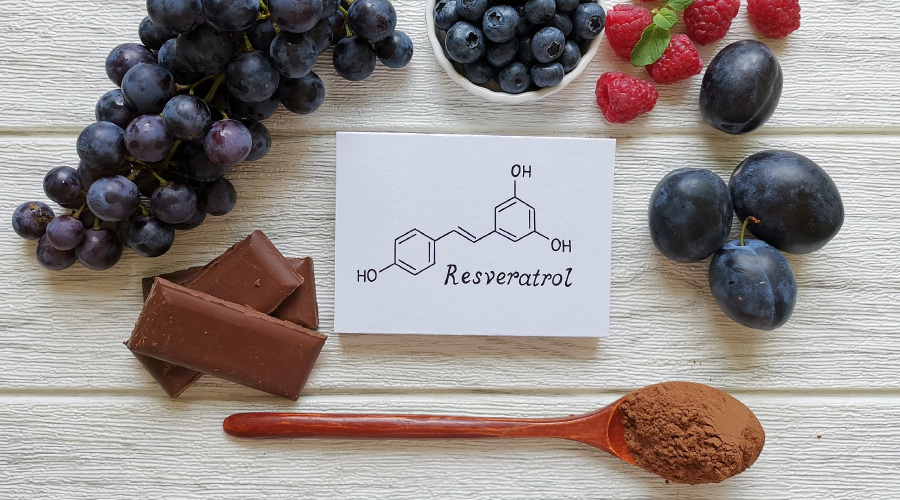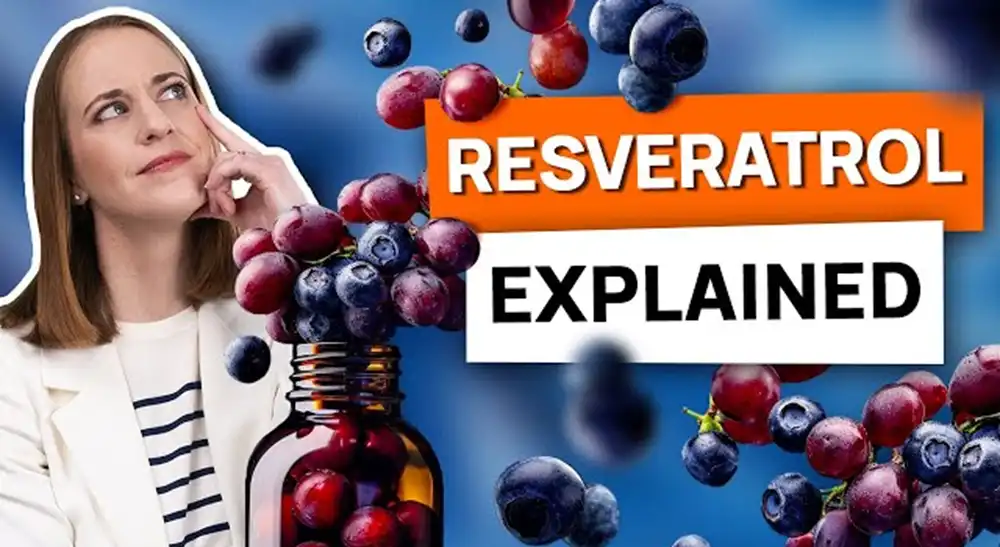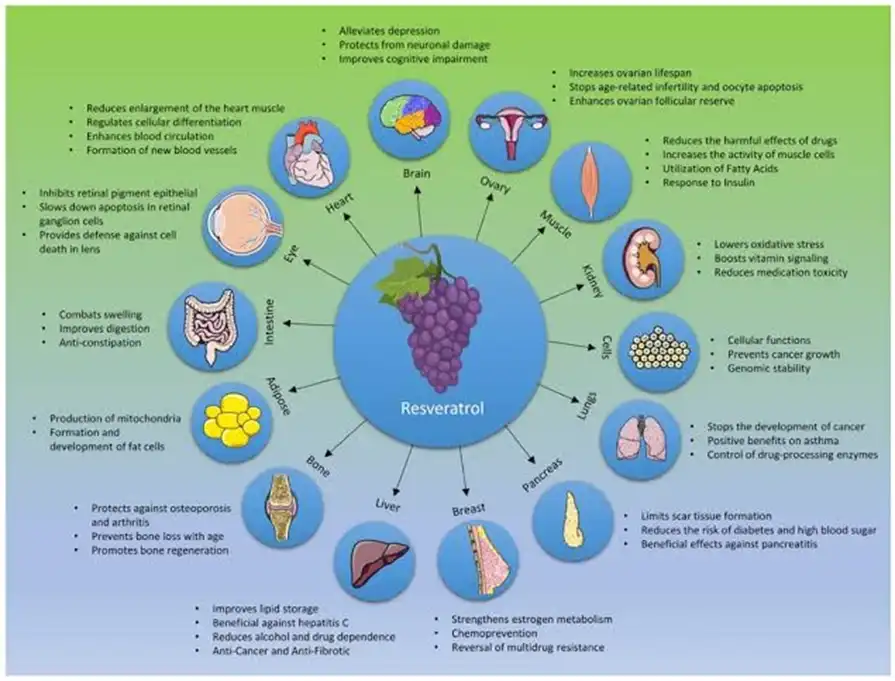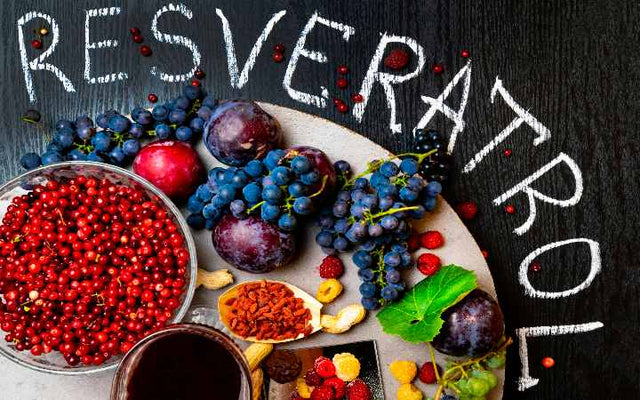What is Resveratrol and Why it is Important?
Resveratrol is part of a group of compounds called polyphenols. They’re thought to act like antioxidants, protecting the body against damage that can put you at higher risk for things like cancer and heart disease. It’s in the skin of red grapes, but you can also find it in peanuts, red wine, berries, and other foods and berries. Research shows promising health benefits, but more is needed regarding how much supplementation you need. If you’ve heard that red wine can help lower cholesterol, chances are you’ve heard of resveratrol — the much-hyped plant compound found in red wine. But beyond being a healthful part of red wine and other foods, resveratrol has health-boosting potential in its own right. In fact, resveratrol supplements have been linked to many exciting health benefits, including protecting brain function and lowering blood pressure.
What Is Resveratrol?
Resveratrol is a plant compound that acts like an antioxidant. The top food sources include red wine, grapes, some berries and peanuts .This compound tends to be concentrated mostly in the skins and seeds of grapes and berries. These parts of the grape are included in the fermentation of red wine, hence its particularly high concentration of resveratrol .However, much of the research on resveratrol has been done in animals and test tubes using high amounts of the compound Of the limited research in humans, most has focused on supplemental forms of the compound, in concentrations higher than those you could get through food.

Why is it important?
Resveratrol, like other antioxidants, causes the body to efficiently detoxify molecules that oxidize other molecules and tissues. Typically, normal body metabolism gives rise to highly reactive and oxidizing molecules called free radicals. Their production is greatly increased during inflammation and stress. Free radicals can cause alterations in DNA, cell membranes, and other vital cellular structures like mitochondria by oxidizing them.

Antioxidants protect the body against these dangerous molecules by capturing and defusing them, thus removing them from the cell environment. Antioxidants also offer themselves to be oxidized by the free radicals, but regenerate themselves. This protects other key molecules and cells from oxidative damage. For this reason, antioxidants are mostly reducing agents, like thiols and polyphenols.
Is it safe?
· When taken by mouth: People often consume resveratrol in small amounts in foods. Resveratrol supplements are possibly safe when taken by mouth in doses up to 1500 mg daily for up to 3 months. Higher doses of up to 2000-3000 mg daily have been used safely for 2-6 months. But these higher doses are more likely to cause stomach upset.
· When applied to the skin: Resveratrol is possibly safe when used for up to 30 days.
· When sprayed into the nose: Resveratrol is possibly safe when used for up to 4 weeks.
· Special precautions & warnings:
· Pregnancy and breast-feeding: Resveratrol is likely safe when used in amounts found in some foods. However, during pregnancy and breast-feeding, the source of resveratrol is important. Resveratrol is found in grape skins, grape juice, wine, and other food sources. Wine should not be used as a source of resveratrol when pregnant or breast-feeding.
· Children: People often consume resveratrol in small amounts in foods. But there isn't enough reliable information to know if it safe to take by mouth in larger amounts. Resveratrol is possibly safe in children when sprayed in the nose for up to 2 months.
· Bleeding disorders: Resveratrol might slow blood clotting and increase the risk of bleeding in people with bleeding disorders.
· Hormone-sensitive condition such as breast cancer, uterine cancer, ovarian cancer, endometriosis, or uterine fibroids: Resveratrol might act like estrogen. If you have any condition that might be made worse by exposure to estrogen, don't use resveratrol.
· Surgery: Resveratrol might increase the risk of bleeding during and after surgery. Stop using resveratrol at least 2 weeks before a scheduled surgery.

The Science Behind Resveratrol
Resveratrol works by activating enzymes called sirtuins, known for their role in cellular repair and longevity. Its antioxidant nature helps neutralize free radicals, reducing oxidative stress—a primary contributor to aging and various chronic diseases. What makes Resveratrol unique is its dual-action: it doesn’t just shield cells but actively supports cellular repair, promoting long-term wellness and youthful vitality.
Key Health Benefits of Resveratrol
Anti-Aging Marvel: Resveratrol helps to combat visible signs of aging, including fine lines and skin elasticity loss, by stimulating collagen production and boosting skin’s resilience. It also offers internal support by improving cell health, creating a more youthful appearance from within.
Heart Health Hero: Studies show that Resveratrol positively impacts cardiovascular health. It promotes blood vessel flexibility, reduces “bad” LDL cholesterol, and protects against arterial damage—essential for maintaining a healthy heart.
Immune Support and Inflammation Reduction: Chronic inflammation is a key factor in many illnesses. Resveratrol’s anti-inflammatory properties help reduce inflammation at the cellular level, potentially reducing the risk of conditions like arthritis and other inflammatory disorders.
Blood Sugar Balance: Promising research suggests Resveratrol may support insulin sensitivity, aiding in blood sugar regulation and lowering the risk of metabolic disorders.
Cognitive and Longevity Boost: Resveratrol’s neuroprotective properties may protect against cognitive decline, promoting mental clarity and long-term brain health. Its role in cellular repair and protection even links it to extended lifespan, making it a favorite among those seeking to age gracefully.
How to Integrate Resveratrol into Your Routine
For those looking to incorporate Resveratrol, options include supplements, skincare products, and a diet rich in foods containing Resveratrol. While red wine and dark chocolate contain small amounts, supplements offer a concentrated dose that can optimize benefits.
The Future of Resveratrol
As research on Resveratrol continues, its potential in areas like cancer prevention, diabetes management, and neuroprotection only grows. Whether you’re looking to enhance your beauty regimen or seek added health protection, Resveratrol stands out as a top contender in the natural wellness realm.

Resveratrol is a phytoestrogen, which means it is a plant compound with estrogenic activity. It has a broadly similar structure to diethylstilbestrol (DES), which is a synthetic estrogen agonist.
Positively impacts brain and heart health
We know resveratrol is an anti-inflammatory because it’s an antioxidant, so it affects cells in your body by protecting them from damage. Most notably, it helps with brain and heart inflammation by providing a protective lining for your blood vessels and preventing insult or injury. This means it could have neuroprotective qualities and help preserve memory and brain function, as well as prevent heart disease and strokes.
Resveratrol on Environmental Health
Resveratrol, a natural antioxidant found in grapes and berries, offers environmental benefits by reducing the need for synthetic pesticides due to its natural antifungal and pest-repelling properties. It supports sustainable agriculture and soil health by promoting beneficial microbial activity, which aids in bioremediation. Additionally, resveratrol extracted from grape byproducts contributes to waste reduction and circular economy efforts in industries like cosmetics and supplements.

In summary It is also found in red wine in higher amounts. Resveratrol has antioxidant and anti-inflammatory properties to protect you against diseases like cancer, diabetes, and Alzheimer’s disease. The anti-inflammatory effects of resveratrol make it a good remedy for arthritis, and skin inflammation. resveratrol supplements are likely safe for most people, they could interact with certain medications and there’s not yet clear guidance on how to use them effectively.
Where to Buy Resveratrol?
You can purchase Resveratrol available with free sample at Yangge Biotech The company is an industry-leading manufacturer and distributor for pure dietary supplements. YANGGE BIOTECH INGREDIENTS is not just a consumer brand. It also supplies pure ingredients to other brands that distribute food and other supplement products. Contact us email: info@yanggebiotech.com to place an order today!
Why Choose Yangge Biotech for High-Quality Resveratrol?
As a leader in natural food coloring and health supplements, Yangge Biotech stands out as a trusted source for Resveratrol, offering purity, potency, and an unwavering commitment to quality. Here are the top reasons why Yangge Biotech is the best choice for your Resveratrol needs:
1. Unmatched Purity and Potency
Yangge Biotech employs rigorous extraction and purification processes that guarantee Resveratrol of the highest potency and purity. This careful processing ensures each dose is optimized to provide the maximum health benefits without impurities or unwanted additives. For customers, this translates into confidence that they’re receiving the best quality Resveratrol available.
2. Sustainably Sourced and Naturally Derived
Committed to sustainability, Yangge Biotech sources Resveratrol from renewable plant sources, ensuring an environmentally friendly and ethical supply chain. The company’s dedication to sustainable sourcing reflects a holistic approach to wellness, prioritizing both individual health and planetary well-being.
3. Quality Assurance and Certifications
Yangge Biotech’s production facilities adhere to the strictest international standards, including Good Manufacturing Practices (GMP) and other global certifications that guarantee the safety, consistency, and quality of their Resveratrol products. This level of quality control provides customers peace of mind, knowing they are investing in a product that meets the highest industry standards.
4. Advanced Research and Innovation
Yangge Biotech is deeply invested in scientific research, continuously working to improve its formulations and delivery methods. Through cutting-edge R&D, Yangge Biotech ensures that their Resveratrol not only meets but exceeds the expectations of health-conscious consumers.
5. Transparency and Traceability
Transparency is key to Yangge Biotech’s approach. Each product comes with complete traceability, from raw material sourcing to the final product. Customers can trust that every step in the production process has been carefully managed and monitored, providing a level of trust that is unmatched in the industry.
6. Competitive Pricing with Exceptional Value
Despite offering premium Resveratrol, Yangge Biotech maintains competitive pricing by managing costs without compromising quality. This balance of cost-effectiveness and quality provides customers with exceptional value, making premium Resveratrol accessible to a broader audience.
With a steadfast commitment to quality, sustainability, and innovation, Yangge Biotech is the go-to choice for those seeking a superior Resveratrol product. Their dedication to excellence ensures that customers receive Resveratrol that not only supports their health but aligns with a broader vision of environmental responsibility and wellness integrity.
References
https://www.healthline.com/nutrition/resveratrol#TOC_TITLE_HDR_11
1. Gonçalinho GHF, Kuwabara KL, Faria NFO, et al. Sirtuin 1 and Vascular Function in Healthy Women and Men: A Randomized Clinical Trial Comparing the Effects of Energy Restriction and Resveratrol. Nutrients. 2023 Jun 29;15:2949. View abstract.
2. Ali Fadlalmola H, Elhusein AM, Al-Sayaghi KM, et al. Efficacy of resveratrol in women with polycystic ovary syndrome: a systematic review and meta-analysis of randomized clinical trials. Pan Afr Med J. 2023 Mar 16;44:134. View abstract.
3. Corbi G, Nobile V, Conti V, et al. Equol and Resveratrol Improve Bone Turnover Biomarkers in Postmenopausal Women: A Clinical Trial. Int J Mol Sci. 2023 Jul 27;24:12063. View abstract.
4. Scaturro D, Vitagliani F, Tomasello S, Sconza C, Respizzi S, Letizia Mauro G. Combined Rehabilitation with Alpha Lipoic Acid, Acetyl-L-Carnitine, Resveratrol, and Cholecalciferolin Discogenic Sciatica in Young People: A Randomized Clinical Trial. Medicina (Kaunas) 2023;59:2197. View abstract.
5. Fatima S, Khan DA, Aamir M, Pervez MA, Fatima F. d-Tocotrienol in Combination with Resveratrol Improves the Cardiometabolic Risk Factors and Biomarkers in Patients with Metabolic Syndrome: A Randomized Controlled Trial. Metab Syndr Relat Disord 2023;21:25-34. View abstract.
6. Abdollahi S, Vajdi M, Meshkini F, et al. Resveratrol may mildly improve renal function in the general adult population: A systematic review and meta-analysis of randomized controlled clinical trials. Nutr Res 2023;113:1-13. View abstract.
7. Nikniaz S, Vaziri F, Mansouri R. Impact of resveratrol supplementation on clinical parameters and inflammatory markers in patients with chronic periodontitis: a randomized clinical trail. BMC Oral Health 2023;23:177. View abstract.
8. Badaoui A. Allergic contact dermatitis to resveratrol and Scutellaria baicalensis root extract in a cosmetic product. Contact Dermatitis 2022. View abstract.
9. Cao X, Liao W, Xia H, Wang S, Sun G. The Effect of Resveratrol on Blood Lipid Profile: A Dose-Response Meta-Analysis of Randomized Controlled Trials. Nutrients 2022;14:3755. View abstract.
10. Gorabi AM, Aslani S, Imani D, Razi B, Sathyapalan T, Sahebkar A. Effect of resveratrol on C-re

